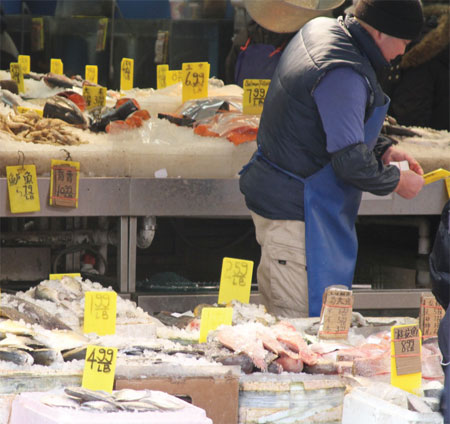NY Chinatowns' seafood markets source of infection: health dept.
|
Seafood markets in Manhattan's Chinatown, where - along with other NY Chinatowns - an outbreak of a rare bacterial infection may have occurred among raw seafood handlers. Amy He / China Daily |
At least 30 people have contracted a non-contagious rare skin infection from handling raw and live seafood in the city's Chinatown areas, according to New York City health officials.
People with the infection reported seeing swelling and red lumps on their arms and hands, the Health Department said in a statement. The infection is called Mycobacterium marinum (M. marinum).
The bacteria is transferred from various contaminated seafood and enters the body through cuts or wounds, causing pain in the hands and arms and affecting mobility of the fingers, according to the department's statement.
"People are encouraged to wear waterproof gloves in their home when preparing live or raw fish or seafood that came from a market in Chinatown, especially if they have cuts or abrasions," the city agency said.
Those who handle fish at seafood markets and restaurants should also wear the necessary protective gear. There is "no risk associated with consuming the food from these markets" and the infection is not contagious, the Department of Health added.
The health department doesn't normally monitor M. marinum nor does it regularly collect data on it, according to Jay Varma, deputy commissioner for disease control, because it is such a rare infection.
"Most doctors would probably never see a case of this infection in their life or at the most one or two depending on where they practice or what they do," Varma told China Daily.
"I think one of the mysteries right now is that we don't know why this many infections occurred over such a relatively short period of time," he said. "This is a very uncommon bacterial infection and it's one that any one person can acquire from a fish tank or an aquarium or even a contaminated swimming pool. But to see 30 cases that occur over a few months is very unusual."
New York City doctors Danny Fong, a plastic and hand surgeon, and Elaine Kung, a dermatologist, alerted the Health Department of an increase of infected patients.
Fong told China Daily that though he had seen cases of M. marinum before, the new number of cases alarmed him enough to consult with other infectious disease colleagues before alerting the Health Department.
"I've been practicing in Chinatown for 21 years and I see about one case every one to two years, but never this many," he said. "This time it was too many for it to be a coincidence."
Fong started encountering more infected patients late last summer, most of whom had handled seafood in the Chinese fish markets, he said. But prior to that, Fong said the patients who had the infection worked in aquariums and on boats.
Infected people should go on antibiotics quickly, Fong advised, but some people have been affected so severely that he has had to drain the infections and operate to clear the infection from nerves and tendons.
The Health Department's statement said that traditional Chinese medicines cannot cure the infection and that if not treated properly with "only a few specific antibiotics," the infection can worsen and lead to surgery.
The Health Department is trying to determine how the outbreak is connected to the fish markets, specifically how fish tanks are maintained and if contaminated seafood is brought in.
Varma said interviews are being conducted with infected patients, most of whom displayed symptoms after purchasing seafood.
A survey of seven Manhattan Chinatown's seafood markets on Thursday by a China Daily reporter showed that most had cartons of raw and live seafood in the open on sidewalks, and that many seafood sellers used rubber gloves while working.
"We can't do this job without having gloves on," said one shopkeeper who declined to give her name. "Especially not in this weather."
Luilend Abdus Samad, a frequent grocery shopper in Chinatown, said that he had heard the news on television but will continue buying food at a supermarket on Mott Street in Chinatown.
"I think the amount that we buy," he said, showing off a big bundle, "shows our confidence."
amyhe@chinadailyusa.com

























